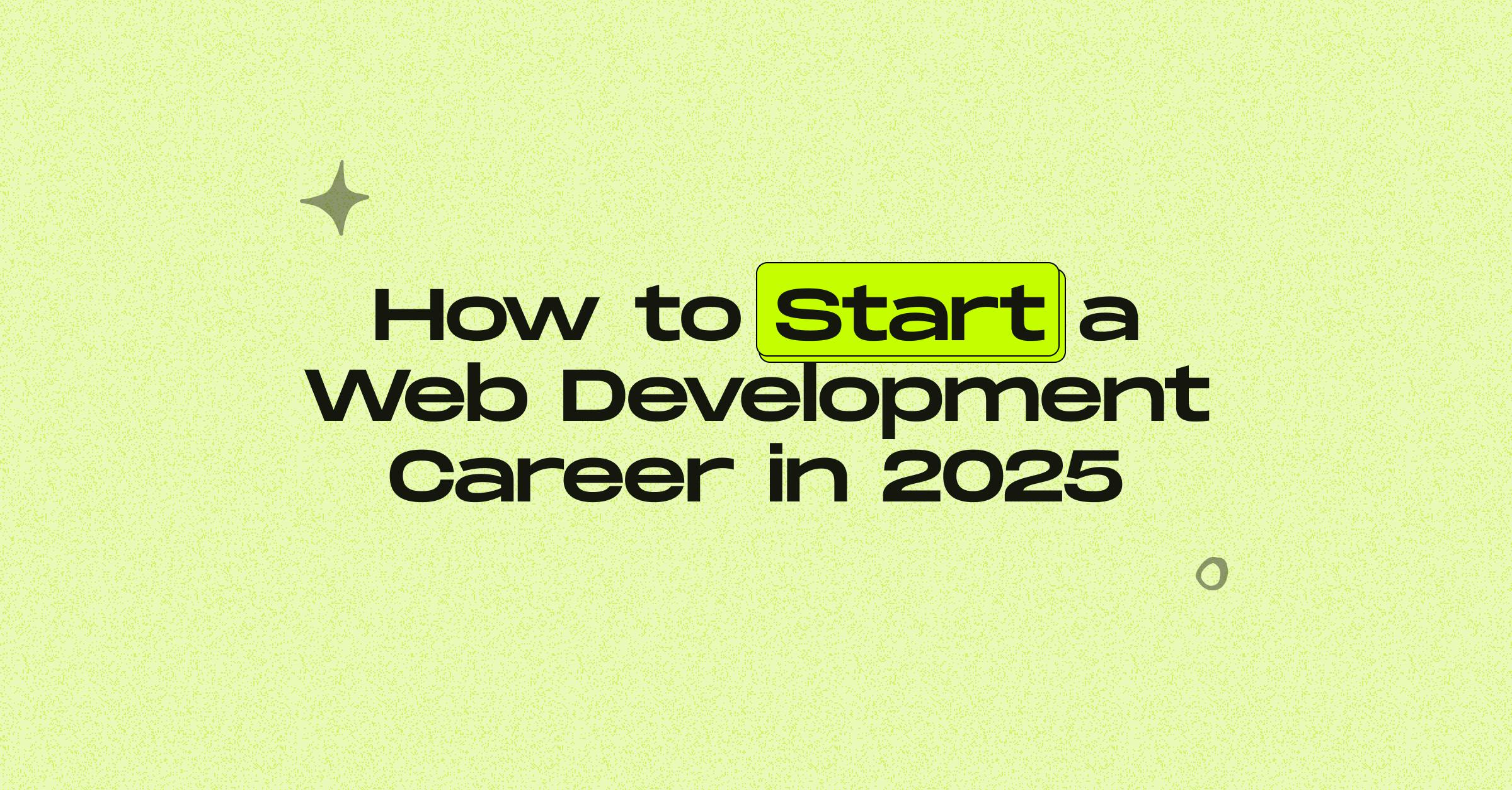July 9, 2025
How to Start a Web Development Career in 2025

Rifat Nawaz

So you’ve been tinkering with CSS and HTML. Hopefully, you’ve built some sites in your spare time as a side hustle, or for your aunt's small candle business. Now you’re considering opening up a full-featured web dev career. Brilliant idea.
Tech in 2025 is booming, and web devs are the quiet back-of-house rockstars you don’t know you need. But let’s be real: opening a career in 2025 has as much to do with being familiar with some languages as it has to do with some level of strategy. Additionally, you should have some knowledge about networking within certain circles. It wouldn't hurt to have some demo that demonstrates you’ve got some pizzazz in addition to the chops.
So, you’re in? It’s time to unlock the code.
Start with a resume that doesn’t suck
While you’re ready to present that app to your dream firm, it’s time to talk about resumes. You’re perhaps a coding genius with a portfolio consisting of pixel-perfect pages, but if your resume sounds as though it were scribbled as some un-of-the-mill grocery list, you’re not getting through the front door. And since robot-driven screeners will often screen resumes today, your resume needs to impress both humans and robots.
You can start by creating separate resumes for each position you apply for. Tedious? Yes. Useful? Absolutely. Reference pertinent experience–even internships, class projects, volunteer projects, or personal sites you built for fun. Reference what you did, not what the project was. Did you increase performance? Built it mobile-first? Collaborated with someone in another location? State it loud and proud.
Now, here’s another pro tip that doesn’t get enough play: run your resume through a resume checker. There are some nifty programs in 2025, like ATS resume checker that will process your resume through some analysis and pick up weak spots. For instance, Rezi’s CV checker automatically reviews what you wrote there for any mistakes. Maybe you didn’t think about mentioning how many users your app had, or you didn’t make action verbs pop. A good resume checker is like that blunt but oh-so-helpful friend you have before you go on a date, who says you have spinach in your teeth. It might sound harsh, but it’s so helpful. Put your resume through one, take the advice to heart, and polish it into something as smooth as that new MacBook you’re hopefully owning.
Learn the fundamentals–and then keep going
This is one field where learning is a lifelong activity. Don’t be afraid, though. Start with the very basics: HTML, CSS, and JavaScript. Get the basics right before you start experimenting with frameworks. If HTML can be said to be the skeleton and CSS the skin, it’s JavaScript that gives life to what you are creating. Get comfortable working with the DOM, studying event handling, and creating simple web applications.
Once you’re confident in the bare trio, you can branch off into frameworks like React, Vue, or Angular. React is still in demand in 2025, and there are countless gigs asking for it. Don’t study it because it’s trendy today, study it because you enjoy how it makes you make things better and earlier.
Oh, and don't skip Git. Version control is the adulting of programming. It's where you get to pick up how to keep your work organised, collaborate with others, and avoid the abomination that is "finalfinalv3 REALthisTime.html".
Build stuff. Anything. Everything.
This distinguishes the dabblers from the doers. Do you wanna get hired? Build. Don't require paid work in order to get experience. Build a weather app that will tell people what they should wear. Build a portfolio site for your friend's pet-sitting business. Build a to-do list app, but make it look fabulous and user-friendly. All projects are yours to infuse your personality, logic, and grit into.
And yes, post your projects on GitHub. Document them in your resume. Share them on LinkedIn. That ‘I made this’ hype matters. Employers must know you’re curious and driven. Your portfolio can matter more than your degree or even extensive work. It’s your proof that you can perform the work, so create project after project like Legos.
Get familiar with the ecosystem.
Tech isn’t just about writing code but about understanding the bigger picture. If you’re aiming for a career in web development, you need to grasp the ecosystem. That means staying in the loop with current trends like web accessibility, mobile-first design, performance optimization, and serverless setups.
Get hands-on with APIs, figure out how browsers operate, and experiment with developer tools in Chrome or Firefox. Want extra credit? Pick up some basics of backend development, even if your focus is front-end. Knowing how data flows through a system makes you sharper and more well-rounded.
And don’t go it alone. Read tech blogs, subscribe to newsletters, watch developer channels on YouTube, and jump into Discord or Reddit communities. Being part of the conversation helps you learn quicker and reminds you that you're not the only one swearing at your screen when a bug refuses to budge.

Network like a human, not a bot
You get gigs through people. Yes, you will post many openings, but don’t underestimate the power of talking with individuals within the industry. You’re not networking–you’re connecting. That means events, online communities, hackathons, or sliding into someone’s DMs whose portfolio you’re digging (respectfully, of course).
Don't ask for work, ask for advice. Have conversations. Be willing to work together. When others see that you are energetic and take the initiative, they will remember you. And if something becomes available at their firm or in their network, guess who they will think to contact first?
References are gold in web dev hiring. Managers think someone in their team knows better than someone they don't know in the pile. So it is strange networking, but do it anyway. It rewards you.
Freelance, intern, or volunteer your way in
All web dev careers don’t necessarily begin with full-time employment. Sometimes opportunities will present themselves in freelance work, internships, or volunteering. Those aren’t steps towards it–they are the career.
Freelance work will show you how to work with real clients and deadlines. Internships will show you about production teams. Volunteering gets your name out and gets quality bullets in your resume.
Make the most of platforms like Upwork, Fiverr, and Freelancer for starter gigs. Or look for non-profits in need of web support and offer your services. Don’t fall into the “work for exposure” trap too often, though. Know your worth and collect when you can. But in the early stages, some free or low-pay gigs can give you the boost you need.
Learn soft skills without rolling your eyes
You didn’t believe web development had anything to do with code, did you? Communication, problem-solving, teamwork, and time management are as important as knowing about JavaScript. Can you explain your decisions back to a client? Can you make good commitment messages? Can you take criticism and remain non-defensive?
In 2025, collaboration is embedded in almost all work. You will be working with designers, product managers, marketing teams, and perhaps some cats walking across the keyboard during Zoom calls. If you come across as friendly, clear, and adaptable, you are someone people will like to work with.
And don’t start me on writing. You don’t need to be the Bard, but readable docs and informative comments in your code? That separates junior devs from future team leads.
Prep for the interview–it’s half game, half grit
When your resume's polished, your portfolio's stocked with cool projects, and you’re actually landing interviews, don't blow it by winging it. Practice some coding exercises. Practice your story. Be ready for ‘Tell me about a time when you debugged a hard bug.’ Because that question's coming, and it's never the time to respond with, ‘Uh, I don't really remember.’
There are numerous mock interview resources, ranging from sites like Pramp and Interviewing.io to friends who can act as interviewers. Utilise them. Know your algorithms, whether you are interviewing for a front-end role or not. Be prepared to discuss your process rather than simply dropping code onto the screen.
Be yourself most of all. Sounds enthusiastic. Be honest about what you know and what you don’t know yet. Interviewers will recognise BS before a linter spots a semicolon in the wrong place. You don’t need all-knowingness, but you do need teachability and enthusiasm.
Keep the momentum rolling
Your first job is a win, but it’s just the start. Tech doesn’t sit still, and neither will you. Keep learning. Challenge yourself with stretch projects. Attend workshops. Perhaps even start writing blog articles or creating videos on YouTube to share your knowledge. It processes information in your brain and helps you build your brand.
Careers in web dev evolve. You can start as a junior front-end dev and discover you adore UX design. Maybe you cross into DevOps, data viz, or integrations with AI. That’s what’s so beautiful about tech–it expands as you grow.
So don’t worry if you don’t know it all yet. Nobody does. Simply start. Build things. Ask questions. Make mistakes. And remember that all the lines of code you write bring you one step closer to being the web developer you desire.
FAQs
Start by learning HTML, CSS, and JavaScript—these are the core building blocks of the web. Build small personal projects, contribute to open-source, and create a portfolio site. Employers care more about proof of work than formal degrees. Internships, freelance work, or volunteering can also help you gain real-world experience.
Focus on HTML, CSS, JavaScript, and Git for version control. Once you’re confident, learn frameworks like React (still in demand in 2025) and consider backend basics like Node.js or Express. TypeScript is also highly recommended for modern development workflows.
Yes. The demand for skilled web developers continue to grow in 2025, especially in e-commerce, SaaS, and mobile-first applications. As long as businesses need websites and digital tools, web development remains a valuable and future-proof career path.
Create real, working projects—anything from a weather app to a portfolio site or a to-do list with unique styling. Host them on GitHub and deploy them with Netlify or Vercel. Add documentation and link to them in your resume and LinkedIn profile to demonstrate your skills.
A degree can help, but it is not necessary. Many successful web developers are self-taught. What matters most is your ability to solve problems, build projects, and explain your thinking. Strong portfolios and networking often matter more than formal education.
In 2025, web devs are expected to have excellent communication, time management, and collaboration skills. You’ll often work with teams across design, marketing, and product. Being able to explain your code, take feedback, and manage deadlines is just as important as your technical knowledge.

